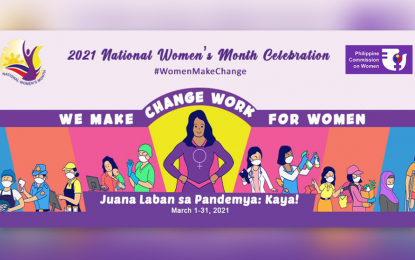
CAGAYAN DE ORO CITY—As the country marks the National Women's Month, young women--including those who identify as transwomen--said that while the fight for gender equality has come a long way, the advocacy to debunk stereotypes and end all discrimination against women and girls must be sustained.
Even amid the pandemic, these women said continuous dialogues and active participation remain key in spreading awareness to protect women's rights, promote greater inclusivity and respect for one's choices.
Schoolteacher Kristine Eblacas, 27, said the most palpable form of stereotype she has experienced is whenever people tell her to get married as she is approaching the 30s.
Not only is this subtle patriarchal imposition disrespectful, but it disregards the women's inherent right to happiness, which for her meant pursuing her career goals--something she thought would have been particularly challenging for a woman if she marries early.
Worse, Eblacas said the notion that women should marry at a certain age seems to perpetuate a derisive ancient concept that women are only meant for childbearing.
At one point, she said an acquaintance in her community insinuated that unlike men who can easily get married because of their gender, women face "limited options" when they age.
"We should work out on respecting women’s choices, opinions, and principles on marriage. Stop pressuring women to get married just because she needs to have a child before she gets older," Eblacas said. "Stop dictating women with your gender-biased standards."
If a single, independent, and childless woman is happy and contented, "she doesn’t owe you an explanation," she added.
Challenging gender stereotypes and changing people's mindsets, however, entails a change in the way women see themselves in the context of gender and development, according to Mary Rose Ratunil, a college student in Alae, Manolo Fortich, Bukidnon.
Ratunil, 21, said women should not only be seen as mere "targets of development, but rather as active agents of these developments."
While she understood that some women deliberately avoid political discourse or taking a role in traditionally male-dominated positions for fear of being targeted, Ratunil said true empowerment only comes if women like her take on the challenge and lead the way in breaking barriers.
In fact, she believes women should seek out roles that challenge the traditional notion of leadership.
"Only few women are given the privilege to lead and to be on the position, when in fact women can equally do the tasks," she said.
Views from transwomen
For individuals who identify themselves as transwomen, the challenges of seeking inclusivity and equality are greater, despite the Filipino society's attitude of being tolerant and accepting of them.
Iztella Ubal-ubal, 23, who resides in Tagoloan, Misamis Oriental, said transwomen don't need special treatment, contrary to what some people may assume.
All they wanted is not to be discriminated against in the workplace or find suitable careers, she said.
Ubal-ubal has been in a relationship with a 29-year-old partner, and the couple is raising an eight-year-old boy--her partner's son from a previous relationship.
Both of them are finding ways to generate more income by working odd jobs, even sell online to make ends meet.
"We (transwomen) have to work to put food on the table, but it gets problematic when employers would ask us to cut our hair and look like men. Some employers are understanding, but there are only a few of them," she said.
She lamented that transwomen still experience unsafe environments and bullying from time to time despite the calls for women's rights.
Justine Gaabucayan, 23, also a resident here, sees the need to hold sustained dialogues to educate the public about the plight not only of transwomen but also of the other people in the lesbian, gay, bisexual, and queer communities (LGBTQ+).
"Transgender people's experience globally is that of extreme social exclusion that translates into increased vulnerability to HIV, other diseases, including mental health conditions, limited access to education and employment, and loss of opportunities for economic and social advancement," Gaabucayan said.
"In addition, hatred and aggression towards a group of individuals who do not conform to social norms around gender manifest in frequent episodes of extreme violence towards transgender people. This violence often goes unpunished," she added.
Despite all this, the women hope the National Women's Month would remain a venue and an opportunity to enlist allies and other advocates who can be their partners for change and development. (PNA)
